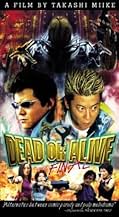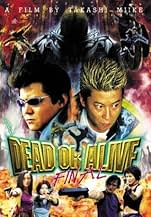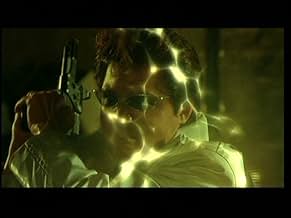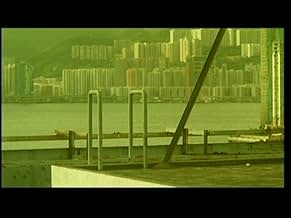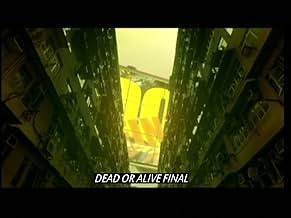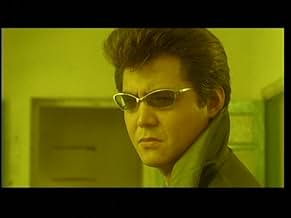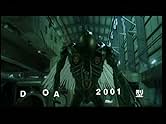IMDb रेटिंग
5.6/10
2.9 हज़ार
आपकी रेटिंग
अपनी भाषा में प्लॉट जोड़ेंThe ace cop of a totalitarian police force and a drifting android play their parts in a post-apocalyptic society. They are destined to fight. Their encounter will change them forever.The ace cop of a totalitarian police force and a drifting android play their parts in a post-apocalyptic society. They are destined to fight. Their encounter will change them forever.The ace cop of a totalitarian police force and a drifting android play their parts in a post-apocalyptic society. They are destined to fight. Their encounter will change them forever.
- निर्देशक
- लेखक
- स्टार
William Wai-Lun Duen
- Gangster
- (as William Duan)
Wai-Kwong Lo
- Gangster
- (as Kenneth Low)
Don Thai Theerathada
- Don
- (as Donald Panutat)
फ़ीचर्ड समीक्षाएं
In the last of a trilogy, Riki Takeuchi and Sho Aikawa are once again on the opposite ends of the spectrum, as they were in the first DOA, after being the best of friends in the second one. Riki is a cop searching for his son being held by a gang whom drifter Sho is a part of. Even though, if you think about it and put yourself in Miike's flow of logic, this ending film is inevitable in it's actions, it's still the less of the three. Of course no Takashi Miike film is totally without merit and such is the case here. There are a few setpeices that make it worthwhile, but the poetry I usually find in a Miike film is not found here (at least in the amounts that I usually expect from this director)
My Grade: C-
My Grade: C-
OK, this doesn't compare to the explosive tempo of the first part's opening sequence; nor to its visual shock value; nor, for that matter, to the melancholic suspense of the second installment. No, it's surprisingly and refreshingly different (apart, of course, from the two main actors). The tongue-in-cheek futuristic scenario drives the characters towards each other across genres and languages with an almost gravitational force. The moment of impact-conclusion is your choice of: a)Shakespearean metaphor of life and humanity in a cartoon costume; b)sublimation of violence into homo-erotics; c)humorous detonation of an impossible buildup. Everything up to then is even less unequivocal.
Highly recommended to indiscriminate movie buffs who don't mind following foie gras with a hot dog; caution to those with more refined palates.
Highly recommended to indiscriminate movie buffs who don't mind following foie gras with a hot dog; caution to those with more refined palates.
I'm so honored to see I'm one of the 3 women who have rated DOA: Final on the IMDb that I feel compelled to comment. Look, Ma, I'm an arcane-trash-cinema hound! Yippee!
Right. Having seen all three DOA films in one evening at a triple-feature (this is what happens when you live in a small French city and only one cinema in town shows subtitled films), I'm in a terrific mood, because the movies were tons of fun. More fun than I'd been expecting, because Miike films seem to come accompanied with user comments like "Don't bring a girl to this." Thanks, guys. Anyway, DOA: Final is, sadly, easily the weakest of the trilogy. After DOA 1, which is a nutso, gutsy genre-jumping yakuza tale, and DOA 2, which pretends to be a yakuza tale for ten minutes and then turns into a Wim Wenders film (and a good one too), this last entry apparently wants to be science fiction. But, alas, it just can't cut the mustard.
Sho Aikawa is the bright point -- as effortlessly, unclassifiably entertaining here as he is in the first two DOAs. With his bad bleach job, crackily teenage voice, tracksuit and sneakers, and zen spaciness, he's as counterintuitive and appealing as you'd expect in his role as a battle cyborg, or "replicant," named Ryo. If I could just watch him hang out with nine-year-olds for two hours, that might be worth the admission price. But even a blond Sho Aikawa is no Rutger Hauer, and he can't make this film work.
The SF premise is of the most worn-out sort -- an authority figure is making people take anti-fertility drugs to stop them having children. Oh, no! The all-business, authoritarian hand of the state is placed in opposition to the natural world of human instinct, family bonds and lush jungle backdrops! That's enough to make a sci-fi movie, right? Throwing in a band of sex-friendly "rebels" doesn't help: Terence Yin and Maria Chen seem to have been cast more for their attractively Eurasian features and ability to look good in camos than for their acting talent. Admittedly, it's a tough trick to shuttle between three languages, but Yin's "acting" in English is just wince-worthy, and Chen isn't convincing even when she doesn't speak.
The pompadoured Riki Takeuchi is fun, as always, here in the role of a police chief caught in a moral dilemma about whether to enforce his boss's orders. But returning to that SF premise, we have the problem of an unaddressed: WHY? What's the motivating engine behind all this evil-drug, Mad-Max-type-rebellion, anti-family stuff? Miike's very hand-wavy about this -- "It's an overpopulation thing" -- but, and this is the bad part, he's none too subtle about suggesting the bad-guy mayor's obvious homosexuality has a lot to do with it. Thanks, Takashi Miike! I guess homosexuals really are the ultimate threat to the survival of humanity, huh? I mean, come on, this crap went out with "Dune." Watch Miike associate homosexuality with pedophilia, decadence, pastel scarves and -- a sign of true evil -- saxophone concerts, in order to see why this movie has to get a three-point deduction for catastrophic moronicity.
This is the only one of the three DOA films I wouldn't see again. It's not without its bright spots, but there are far too many negatives to make it hold together. In the little quality meter in my head, I was rating it as low as a 4/10, right up until the final five minutes. Then I started laughing my head off. The bizarreness of Miike's wrap-up pushes the whole experience up to a 5/10. But, you know, if an out-of-left-field conclusion improves the filmic experience, you can be pretty sure there's something wrong with the movie to begin with. Unfortunately, in this case there's quite a lot.
Right. Having seen all three DOA films in one evening at a triple-feature (this is what happens when you live in a small French city and only one cinema in town shows subtitled films), I'm in a terrific mood, because the movies were tons of fun. More fun than I'd been expecting, because Miike films seem to come accompanied with user comments like "Don't bring a girl to this." Thanks, guys. Anyway, DOA: Final is, sadly, easily the weakest of the trilogy. After DOA 1, which is a nutso, gutsy genre-jumping yakuza tale, and DOA 2, which pretends to be a yakuza tale for ten minutes and then turns into a Wim Wenders film (and a good one too), this last entry apparently wants to be science fiction. But, alas, it just can't cut the mustard.
Sho Aikawa is the bright point -- as effortlessly, unclassifiably entertaining here as he is in the first two DOAs. With his bad bleach job, crackily teenage voice, tracksuit and sneakers, and zen spaciness, he's as counterintuitive and appealing as you'd expect in his role as a battle cyborg, or "replicant," named Ryo. If I could just watch him hang out with nine-year-olds for two hours, that might be worth the admission price. But even a blond Sho Aikawa is no Rutger Hauer, and he can't make this film work.
The SF premise is of the most worn-out sort -- an authority figure is making people take anti-fertility drugs to stop them having children. Oh, no! The all-business, authoritarian hand of the state is placed in opposition to the natural world of human instinct, family bonds and lush jungle backdrops! That's enough to make a sci-fi movie, right? Throwing in a band of sex-friendly "rebels" doesn't help: Terence Yin and Maria Chen seem to have been cast more for their attractively Eurasian features and ability to look good in camos than for their acting talent. Admittedly, it's a tough trick to shuttle between three languages, but Yin's "acting" in English is just wince-worthy, and Chen isn't convincing even when she doesn't speak.
The pompadoured Riki Takeuchi is fun, as always, here in the role of a police chief caught in a moral dilemma about whether to enforce his boss's orders. But returning to that SF premise, we have the problem of an unaddressed: WHY? What's the motivating engine behind all this evil-drug, Mad-Max-type-rebellion, anti-family stuff? Miike's very hand-wavy about this -- "It's an overpopulation thing" -- but, and this is the bad part, he's none too subtle about suggesting the bad-guy mayor's obvious homosexuality has a lot to do with it. Thanks, Takashi Miike! I guess homosexuals really are the ultimate threat to the survival of humanity, huh? I mean, come on, this crap went out with "Dune." Watch Miike associate homosexuality with pedophilia, decadence, pastel scarves and -- a sign of true evil -- saxophone concerts, in order to see why this movie has to get a three-point deduction for catastrophic moronicity.
This is the only one of the three DOA films I wouldn't see again. It's not without its bright spots, but there are far too many negatives to make it hold together. In the little quality meter in my head, I was rating it as low as a 4/10, right up until the final five minutes. Then I started laughing my head off. The bizarreness of Miike's wrap-up pushes the whole experience up to a 5/10. But, you know, if an out-of-left-field conclusion improves the filmic experience, you can be pretty sure there's something wrong with the movie to begin with. Unfortunately, in this case there's quite a lot.
Picks up again where part 2 ended with a summary and the end did remind you of the best parts of part 1 and 2 but this taking place in the future also takes the movie further away from the original script then ever.
The end scene is again one you will have a WTF feeling and the part were they are some kind of robots just didn't work for me. Again, as in the other two reviews this leans the best towards Yatterman (2009). But on the other hand we do have more martial art fightings then in the other entries. And the fact that girls are involved takes it also to another dimension. Still, not gory or creepy like most of Miiki's flicks. For me the best entry in the franchise but still not my cup of tea.
Gore 1/5 Nudity 0/5 Effects 2/5 Story 3/5 Comedy 0/5
The end scene is again one you will have a WTF feeling and the part were they are some kind of robots just didn't work for me. Again, as in the other two reviews this leans the best towards Yatterman (2009). But on the other hand we do have more martial art fightings then in the other entries. And the fact that girls are involved takes it also to another dimension. Still, not gory or creepy like most of Miiki's flicks. For me the best entry in the franchise but still not my cup of tea.
Gore 1/5 Nudity 0/5 Effects 2/5 Story 3/5 Comedy 0/5
Out of the three in the trilogy, I'd say this is the second strongest. It starts with some very amazing action, but goes downhill from there. Thematically it's similar to the previous films, but the story and point of the movie get muddled somewhere along the way. The ending is quite nuts, and reminded me of TETSUO. By the way, did you know that the director of TETSUO played Ichi's father figure in Ichi The Killer?
क्या आपको पता है
- कनेक्शनEdited from Dead or Alive: Hanzaisha (1999)
टॉप पसंद
रेटिंग देने के लिए साइन-इन करें और वैयक्तिकृत सुझावों के लिए वॉचलिस्ट करें
विवरण
- रिलीज़ की तारीख़
- कंट्री ऑफ़ ओरिजिन
- आधिकारिक साइट
- भाषाएं
- इस रूप में भी जाना जाता है
- Dead or Alive 3: Duelo final
- फ़िल्माने की जगहें
- उत्पादन कंपनियां
- IMDbPro पर और कंपनी क्रेडिट देखें
बॉक्स ऑफ़िस
- US और कनाडा में सकल
- $2,591
- US और कनाडा में पहले सप्ताह में कुल कमाई
- $1,841
- 1 दिस॰ 2002
- दुनिया भर में सकल
- $2,591
इस पेज में योगदान दें
किसी बदलाव का सुझाव दें या अनुपलब्ध कॉन्टेंट जोड़ें


